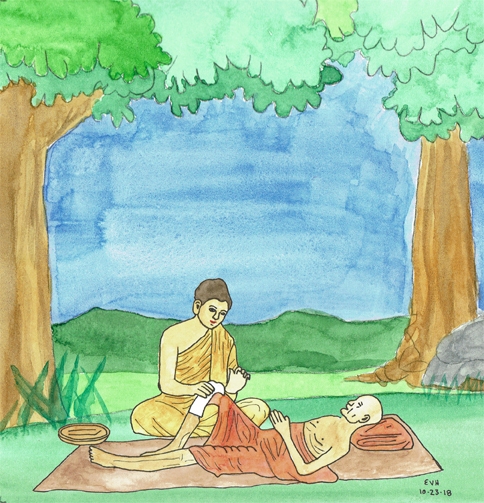
Jataka 95
Mahāsudassana Jātaka
The Great Sudassana
as told by Eric Van Horn
originally translated by Robert Chalmers, B.A., of Oriel College, Oxford University
originally edited by Professor Edward Byles Cowell, Cambridge University
This Jātaka is drawn at least partially from the lengthy treatment of the end of the Buddha’s life in the Parinibbāna Sutta [DN.1].
The locations of Kusinārā – where the Buddha died - was lost for centuries. It was rediscovered by the British archeologist Alexander Cunningham in the late 19th century. It is one of the destinations for Buddhists who go to India on pilgrimage. It is more commonly known by the name “Kushinagar.” This is also where the Buddha was cremated. There is a stupa at the cremation site.
This Jātaka quotes a common catch phrase in the Pāli Canon and one of the Buddha’s most succinct and important teachings, “All compounded things are impermanent.”
“How transient.” This story was told by the Master as he lay on his death bed. It is about Ānanda’s words, “Oh Blessed One, do not pass away in this sorry little town.” (A similar passage occurs in the Digha Nikāya: “Lord, may the Blessed Lord not pass away in this miserable little town of wattle-and-daub, right in the jungle in the back of beyond!” [DN 16.5.7])
When the Buddha was living at Jetavana, the Master thought, “The Elder Sāriputta, who was born in Nāla village, died at Varaka in the month of Kattika (the 8th lunar month, October-November) when the moon was full. In the same month, when the moon was on the wane, the great Moggallāna died. My two chief disciples being dead, I too will pass away, in Kusinārā.”
So thought the Blessed One.
On his alms pilgrimage, he subsequently came to Kusinārā. There he lay down upon the Northward bench between twin Sāl trees, never to rise again. Then the Elder Ānanda said, “O Blessed One, do not pass away in this sorry little town, this rough little town in the jungle, this little suburban town. Should not Rājagaha or some other large city be the death place of the Buddha?” (Rājagaha was the capital city of the kingdom of Magadha.)
“No, Ānanda,” the Master said. “Do not call this a sorry little town, a little town in the jungle, a little suburban town. In bygone days, in the days of Sudassana’s universal monarchy, I lived in this town. Then it was a mighty city surrounded by jeweled walls 40 miles around.” Then, at the Elder’s request, he told this story of the past and uttered the Mahāsudassana Sutta [DN 17].

Figure: Ānanda and the Dying Buddha
Then it was that Sudassana’s queen Subhaddā, after coming down from the Palace of Truth, saw her lord lying on his right side on the couch prepared for him in the Palm Grove. The couch from which he was not to rise again was covered in gold and jewels. And she said, “There are eighty-four thousand cities, chief of which is the royal city of Kusāvatī, over which you have sovereignty, sire. Set your heart on them.”
“Do not say that, my queen,” Sudassana said. “rather encourage me, saying, ‘Keep your heart set on this town and do not yearn for those others.’”
"Why so, my lord?"
"Because I shall die today," answered the king.
In tears, wiping her streaming eyes, the queen managed to sob out the words the King told her to say. Then she broke into weeping and lamentation. And the other women of the harem, to the number of 84,000, also wept and wailed. None of the courtiers could bear it, either. All alike joined in one universal lament.
“Peace!” said the Bodhisatta, and at his word their lamentation was stilled. Then, turning to the queen, he said, “Do not weep or wail, my queen. For, even down to the tiniest seed, there is no such thing as a compounded thing that is permanent. All is impermanent. All must decay.” Then, for the queen’s benefit, he uttered this stanza:
How impermanent are all compounded things!
It is their nature to decay.
They arise, and they dissolve again.
And then it is best, when they have sunk to rest.
Thus did the great Sudassana give his discourse with divine Nirvana as its goal. Moreover, to the rest of the multitude he gave the exhortation to be charitable, to obey the Precepts, and to observe the Uposatha days. (Uposatha days are special practice days for both monastics and lay people. They occur on the days of the new moon and full moon.) And when he passed away, he was reborn in the Realm of Devas.
His lesson ended, the Master identified the birth by saying, “The mother of Rāhula was the Queen Subhaddā of those days. Rāhula was the King’s eldest son. The disciples of the Buddha were his courtiers, and I myself the great Sudassana.” (Before he was the Buddha, Siddhārtha Gotama was married to a woman named “Yasodharā.” In the Pāli Canon she is simply identified as the “mother of Rāhula.” We know her real name from the Pāli commentaries.)
